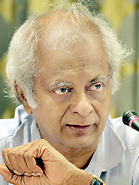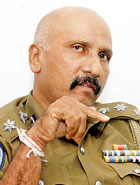News
Silent walk next Sunday to highlight extent of child abuses
There will be no placard-carrying or slogan-shouting, as thousands of white-clad men, women and children take to the streets, next Sunday, September 30, in major towns in all districts, in a ‘silent walk’ to bring into focus the grave issue of child abuse.
In view of World Children’s Day falling on October 1, the main objectives of this walk will be to mobilize communities to collectively protect children and to send a clear message to perpetrators that communities are watching them, said activist Visakha Tillekeratne, part of the ‘Citizens for a secure Sri Lanka’.

Today’s abused boys will become tomorrow’s abusers.” Prof. de Silva
This group of like-minded individuals and organizations has come together on a common platform not only to organize the walk but also with long-term plans. The walk will be the first in a series of ‘Out of the box thinking’ to prevent violence against women and children, the Sunday Times learns.
Comparing the sexual abuse issues seen in Sri Lanka to the tip of the ice-berg, Prof. Harendra de Silva, Professor of Paediatrics and first Chairperson of the National Child Protection Authority (NCPA), stressed that two-thirds of the problem is hidden.
There is a ‘societal responsibility’, he reiterated, explaining that it is not only the authorities who must act but society must get the authorities to take action. “If we keep quiet, we become passive perpetrators,” he pointed out at a media briefing held on Thursday.
Referring to a general breakdown in law and order, this child rights activist said when a victim or a parent withdraws a complaint on being threatened or bribed, they too contribute to this situation. The repercussions of a breakdown in law and order include people not reporting child abuse cases as action is not forthcoming; perpetrators becoming more fearless and bold; and sometimes the public taking the law into their own hands.
During his work on child protection he had found that 10% of girls and 20% of boys had been abused. “Today’s abused boys will become tomorrow’s abusers,” he warned.
Citing solid data, Prof. de Silva said that in 2011 there were over 4,000 cases of serious sexual abuse of children. One-third of all indictable offences were child abuse cases. Add to this rape of women and anyone can see what a major issue it is.
Dealing with the gravity of child abuse, he said a small percentage of child-victims are resilient and may not indicate any physical or mental harm. But it’s like a boiling and smoking cauldron, smouldering away.
Some of the child-victims, especially boys and a small percentage of girls will turn into abusers as adults. A study shows that 65% of abusers had themselves been abused as children, he said, pointing out that another factor is the vulnerability of abuse-victims to more abuse increases.
With much experience in battling child abuse, Prof. de Silva says the long-term impacts of abuse could be promiscuity as adults, as well as becoming commercial sex workers. He gave the figure of 40% of commercial sex workers having been abused as children.
Some abused boys have a higher tendency to become homosexuals, while abused children have various psychological problems including suffering from Post-Traumatic Stress Disorder. Some reactions such as depression, suicidal feelings and even psychopathic tendencies may come later in adulthood. It had also been found that in many instances serial killers had faced abuse as children.
Activated after a spate of despicable crimes against both women and girls, the ‘Citizens for a secure Sri Lanka’ group has been brain-storming since July to combat this menace which has caught Sri Lanka in a vice-like grip.
Urging a zero-tolerance policy and a campaign targeting violence against women and girls, the group is calling for judicial processes to be made more efficient; activation of recommendations made in the ‘Report on suspended sentencing on rape’; creation of a unit in the Attorney General’s Department for the expeditious prosecution of rape cases that will link the women’s and children’s bureau in the police stations; resourcing, strengthening and training of the police to carry out their duties in an efficient manner; and implementation of plan for the comprehensive rehabilitation of victims.
Attempting to sew together as a whole, the work being done by different groups, to bring about a better impact, discussions are also underway to set up a Rape Crisis Centre, it is learnt.

The members of ‘Citizens for a secure Sri Lanka’ addressing the media on Thursday at the Cinnamon Grand Hotel. From left are Visakha Tillekeratne (Founder of Justice for Victims); Caryll Tozer-Perera, (Founder member of Women-in-Need); Prof. Harendra de Silva, Shantha Jayalath (Commissioner of Girl Guides); Shanthi Sachithanandam (Chief executive Officer of Viluthu); and Girl Guide Kavindya Tennekoon. Pic by M.A. Pushpa Kumara
The ‘All-Island Silent Walk for Children’ being supported by the Girl Guides, Boy Scouts, Sarvodaya, NGOs, women’s and children’s groups, the NCPA, the Department of Probation and Child Care, clergy and service personnel will be held in the morning of September 30 in the other districts and at 2.30 p.m. in Colombo.
The walk in Colombo will start from three points — the Sri Lanka Girl Guides’ Association near the Public Library, Devi Balika School’s Model Farm Road entrance near Kanatte and Visakha Vidyalaya, Vajira Road, Colombo 4. The end point will be either the Colombo University grounds or Independence Square.
Children must have elders to confide in
Adding the children’s voice, Girl Guide Kavindya Tennekoon who is 16 years old urged adults to pinpoint what is normal and not normal to children because in their innocence they do not know the difference, especially if a crime is being perpetrated by someone close to them.
Children should also be able to tell an adult what is happening to them, she said, asking why the little girl in Kirulapone who was abused and killed recently could not tell her mother what trauma she was undergoing.
Kavindya suggested that schools should have a box where children can put down in writing what issues they are facing; discreet counsellors whom the children can approach; and proper textbooks on health.
Now if you tell a teacher about a problem or issue, it will be spread in the staff room, which in many schools is like a gossip centre, she alleged.
Follow @timesonlinelk
comments powered by Disqus























